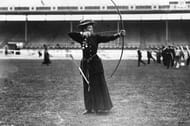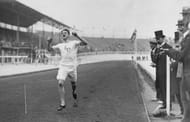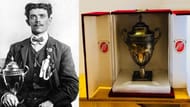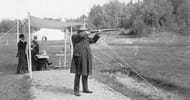Following a trip into the American Wild West in St. Louis, Missouri, the Olympics were to return to Europe. However, for the first time, the quadrennial event came to London, a city well known for being the seat of the most powerful empire at the time. It was one of four venues chosen for the event.
As with St. Louis in 1904, London was not the original choice for the 1908 Summer Olympics. However, owing to the volcanic eruptions in Italy two years prior, the city volunteered to take up the job. A job it did so well that it got the opportunity to host the the Games again. In total, London hosted the event thrice; in 1908, 1948 and 2012.
A new Olympic standard
The 1908 event also saw the establishment of standard rules for sports and selection of judges from different countries instead of just the host. This came about following the 400m race where US runner John Carpenter was accused of interfering with a British runner.
However, the first of the London Olympics is also known for the rise of champions such as Swede Oscar Swahn. An expert in 100 meter running deer, a discontinued ISSF shooting event, he made his Olympic debut at 61, an age when most consider it wise to hang up their boots.
The event also witnessed the participation of Sir Cosmo Duff-Gordon, a Scottish aristocrat who wished to emulate Frank Kugler from the USA. He won a silver medal in team fencing at the interim Olympics in Athens in 1906.
Sir Duff-Gordon even participated in pistol shooting at the London Olympics. Apart from that, he was a part of the organizing committee. However, nothing brought him as much attention as the fact that he survived the sinking of the RMS Titanic. But that's a story for later. Here are some unforgettable moments from the London Olympics:
Not the first choice but the best one for sure

The majestic Italian capital of Rome was originally to host the 1908 Olympics . London, Berlin and Milan were the other three choices.
However, following the violent eruption of Mount Vesuvius in 1906, which claimed more than 100 lives, Rome had to be dropped. The event was moved to London after the city volunteered to host.
This was the fourth chronological modern Summer Olympics in keeping with the now-accepted four-year cycle, as opposed to the alternate four-year cycle of the proposed Intercalated Games.
The London Olympics also recorded another historical first. The distance from the start of the marathon to the finish at the stadium was established at these games. The original 25-mile distance of the marathon event was changed to 26 miles so that it could start at Windsor Castle. It was then changed again at the request of Princess Mary so that the start would take place beneath the windows of the Royal Nursery.
Yes, to ensure that the Royal family had a proper view, the distance of the marathon event was changed. For better or worse, the standardization had begun.
The longest Olympics in the history of mankind

Between 1900-1924, the Games were quite long. But the London Olympics in 1908 were arguably the longest in the history of mankind.
It began on April 27 that year and ended exactly six months later, on October 31. That's a sum total of six months and four days!
Other than the Stockholm Olympics in 1912, it was the only edition to last over a month. Over 2008 athletes from 22 nations participated.
In a way, the London Olympics helped pave the way for the Winter Games which eventually materialized in 1924. In London, four figure skating events were organized. Although held much later on in the proceedings, on October 28 and 29, they were within the ambit of the main event.
Standardization of rules
![Standardization of Rules [Image for Representational Purposes]](https://staticg.sportskeeda.com/editor/2021/07/efc2c-16252156796964-800.jpg?w=190)
It was at the London Olympics that the foundation for standardization of rules was laid. Until then, there was no clear basis for standard rules. Races were run on random grounds. There were no formal tracks, or even formal marathon distances for that matter.
Another reason for the standardization of rules was the 400-meter event. British officials accused John Carpenter, an American runner, of interfering with an English competitor. The cause of contention was that while American rules allowed it, the British ones didn't.
Since the London Games were held under British rules, they decided to disqualify Carpenter. However, to the surprise of local runner Wyndham Halswelle, as well as the organizing officials, two other runners refused. This was because both of them, William Robbins and John Taylor, were Americans. For them, expelling Carpenter was unfair. As a result, Halswelle remains the only man to be awarded an Olympic gold medal unopposed in 400 meters.
Thanks to such rickety rules, the British were forced to rethink. It is to the credit of the 1908 Games that Olympic rules were standardized.
Dorando Pietri - The unluckiest winner

When Dorando Pietri participated in the marathon event of the 1908 Games, he was touted as one of the favorites. On July 24, as the marathon got underway, the weather was particularly hot by British summer standards.
Initially, like Thomas Hicks, Pietri began his race at a rather slow pace. However, in the latter half of the course, he stepped it up a notch. By the 32km mark, he was in second position, four minutes behind the then leader Charles Hefferon, a South African runner.
When he learnt that Hefferon was in crisis, Pietri further increased his pace, overtaking him at the 39km mark. It was at the end of the race that Pietri felt the aftereffects of the pace. When he entered the stadium, thoroughly exhausted, he took the wrong path. After the umpires redirected him, he fell down for the first time but got back up with their help in front of 75,000 spectators.

Pietri eventually won the race. However, since he received assistance on multiple occasions, he was disqualified following an official complaint lodged by the American team. However, since Pietri didn't commit the offense intentionally, he was compensated with a silver cup by Queen Alexandra herself.
To top it all, the author of Sherlock Holmes, Sir Arthur Conan Doyle, launched a subscription fund to help Pietri raise a bakery in his native town. The drive was extremely successful, fetching Pietri a then-considerable sum of 305 pounds.
Oscar Swahn and Sir Cosmo Duff Gordon - two sportsmen who became famous for different reasons

The 1908 Olympics also became famous for the rise of two sportsmen. Both attained fame for different reasons.
The first man was Swedish shooter Oscar Swahn. At the advanced age of 61, he made his debut in shooting. Proving that it's never too late to start afresh, Swahn bagged the gold medal in the single-shot running deer competition, as well as the dual competition.
He returned for the 1912 edition of the Games to win another gold medal and a bronze as well. At the 1920 Summer Olympics in Antwerp, Swahn, now aged 72, won a silver medal. Till date, he remains the oldest Olympian to win a medal.
The second man was Scottish aristocrat Sir Cosmo Duff-Gordon. A member of the organizing committee at the London Olympics, he tried his hand at both shooting and fencing. At the 1906 Intercalated Games in Athens, he managed to bag the silver medal.
However, Sir Duff-Gordon earned more notoriety for his involvement with the sinking of the Titanic. He survived the sinking, but chose not to go back to help the drowning survivors. Whatever his compulsion, this act of infamy left a lasting dent in his reputation.
